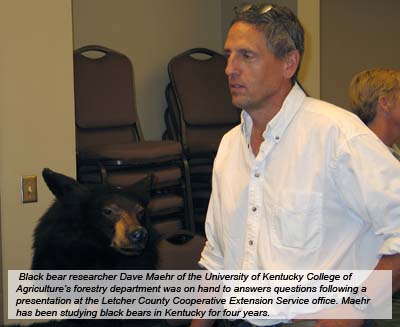Black Bear Sightings Create Curiosity, Need for Public Education
Black Bear Sightings Create Curiosity, Need for Public Education

Black bear sightings are more common in eastern Kentucky these days. Yet, when Shad Baker heard that a bear was spotted near the Letcher County Cooperative Extension Service office where he works, he was a little skeptical. Must be a "big dog or something," he thought.
His skepticism turned out to be short-lived. The bear that had reportedly ventured past the city swimming pool, through two subdivisions and alongside a four-lane highway earlier that day also found his way up a winding road to the Extension office perched above the city of Whitesburg.
“It tickled me to see something like that up here,” said Baker, Extension agent for agriculture and natural resources. “It was exciting.”
It was also timely. Baker and colleagues in surrounding counties as well as in the forestry department at the University of Kentucky College of Agriculture were in the process of planning an educational program to help area residents learn more about the black bear’s return to the state. A day trip through Whitesburg by one such bear made the program seem all the more apropos. “People are not used to having the bears around,” Baker said. “So they really need to be educated about what to do and what not to do in regards to the bears so that there’s not a conflict.”
“People are not used to having the bears around,” Baker said. “So they really need to be educated about what to do and what not to do in regards to the bears so that there’s not a conflict.”
Apparently, Baker is not alone in his sentiments. Some 40 area residents showed up at the Letcher County Extension office last week to hear UK researcher Dave Maehr and Steven Dobey of the Kentucky Department of Fish and Wildlife Resources shed light on the large charismatic creatures that, as Dobey said, are once again “knocking on our front door.”
“The black bear is the most American bear we have,” Maehr told the group. “It is truly ours.”
Although Kentucky was once full of these bears and was even referred to as the “bear state,” unregulated harvests and loss of habitat nearly wiped them out for more than a century, Maehr explained. Only in the past few years has the black bear begun to return and given experts a reason to think a resurgence is possible.
“We struggle with how many bears are out there all the time,” Maehr said, but added that the bear population is “at least stable or slightly increasing.”
Maehr, who has been studying black bears in Kentucky for four years, said that since 2002 he and his team have humanely trapped 65 black bears specifically for research purposes. Several of those bears were fitted with radio collars to help the researchers track their movements and learn more about their habitat and food needs.
The bears being tracked are mostly located in forests covering the rugged Pine, Black and Cumberland mountains where Kentucky borders West Virginia, Virginia and Tennessee.
“That’s some of the most uninterrupted forest anywhere in Kentucky,” Maehr said. Although much remains to be learned, Maehr told those gathered that some exciting new work will give researchers a better idea of how bears live and what they need to survive in Kentucky. For example, a project that involves collecting hair samples off barbed wire snares is providing yet another way to test the bear population and understand distribution patterns.
Although much remains to be learned, Maehr told those gathered that some exciting new work will give researchers a better idea of how bears live and what they need to survive in Kentucky. For example, a project that involves collecting hair samples off barbed wire snares is providing yet another way to test the bear population and understand distribution patterns.
While Maehr and his research team are collecting data, Dobey and his colleagues at the Kentucky Department of Fish and Wildlife Resources are working to reduce the potential for human-bear conflicts. The two most important things to remember: Do not feed the bears and enjoy them at a distance, Dobey said.
“One of the most important detriments is it is possible to love a bear to death,” he said, adding that people often think they’re “cute” and leave food out to keep them coming around. The bears then begin to get accustomed to searching for food in residential areas, creating problems for both the bears and the people who live there.
“Feeding them teaches bears to quickly associate you … with food,” he said. “It’s probably the worst thing you can do.”
Removing the bears’ access to pet food, birdfeeders, garbage and other food sources is also important.
“If a bear doesn’t have access to food for five to seven days, he’s going to go somewhere else,” Dobey said.
In addition to reducing human-bear conflicts, another management goal is to establish adequate habitat for black bears to enable the population to expand. Dobey said his department hopes to see the number of bears increase enough to eventually have a sustainable bear harvest “like most of our neighboring states.”
Dobey cautioned, though, that many things must be considered before the hunting of black bears is allowed, including protecting core areas of bear habitat and the female segment of the population.
As the population of black bears continues to grow, so, too, will the curiosity surrounding them. Baker said the program in Letcher County is a good start to increasing the public’s awareness of these interesting – and beneficial – creatures.
“The fact that they’re here can be a great asset for the county and the region,” Baker said.